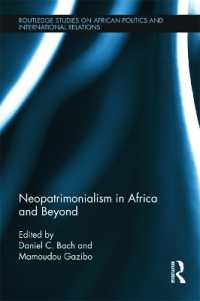基本説明
New in paperback. Hardcover was published in 2007. Controversially questions whether the recent explosion in investment treaty arbitration is a corruption of public law principles, asking whether it is right that private arbitrators rather than public judges adjudicate on the actions of the State.
Full Description
The recent explosion of investment treaty arbitration marks a major transformation of both international and public law, above all because of the manner in which states have delegated core powers of the courts to private arbitrators.
This book outlines investment treaty arbitration as a public law system and demonstrates how the system goes beyond all other forms of international adjudication in giving arbitrators a comprehensive jurisdiction to determine the legality of sovereign acts and to award public funds to businesses that sustain loss as a result of government regulation. The analysis also reveals some startling consequences of transplanting rules of commercial arbitration into the regulatory sphere. For instance, the system allows public law to be interpreted by arbitrators in private as a matter of course, with limited scope for judicial review. Further, arbitrators can award compensation to investors in ways that go beyond domestic systems of state liability, and these awards may then be enforced in as many as 165 countries, making them more widely enforceable than any other adjudicative decision in public law.
The system's mixture of private arbitration and public law undermines accountability and openness in judicial decision-making. But, most importantly, it poses a unique and fundamental challenge - hitherto neglected by other commentators - to the principle of judicial independence. To address this, this book argues that the system be replaced with an international investment court, properly constituted according to public law principles, and made up of tenured judges.
Contents
1. Introduction ; 2. A Return to the Gay Nineties? ; 3. From Contract to Public Law ; 4. Scope and Standards of Review ; 5. The Transformation of International Law ; 6. Approaches and Interpretations ; 7. The Businessman's Court






